Exploring Ethical Issues in Social Media: MSC Finance and Risk
VerifiedAdded on 2024/05/17
|9
|2467
|259
Essay
AI Summary
This essay examines the ethical issues arising from the increasing use of social media platforms, particularly in the context of finance and risk management. It discusses the challenges of distinguishing between public and private spaces online, the importance of companies complying with ethical standards, and the role of policy clarity in maintaining ethical conduct. The essay also delves into normative theories, including egoism, utilitarianism, and the ethics of rights and justice, to provide a comprehensive understanding of ethical decision-making in the digital age. Real-world examples, such as Nestle's compliance issues and Facebook's content moderation challenges, are used to illustrate the practical implications of these ethical considerations. The essay concludes by emphasizing the need for individuals and organizations to navigate the ethical complexities of social media responsibly.
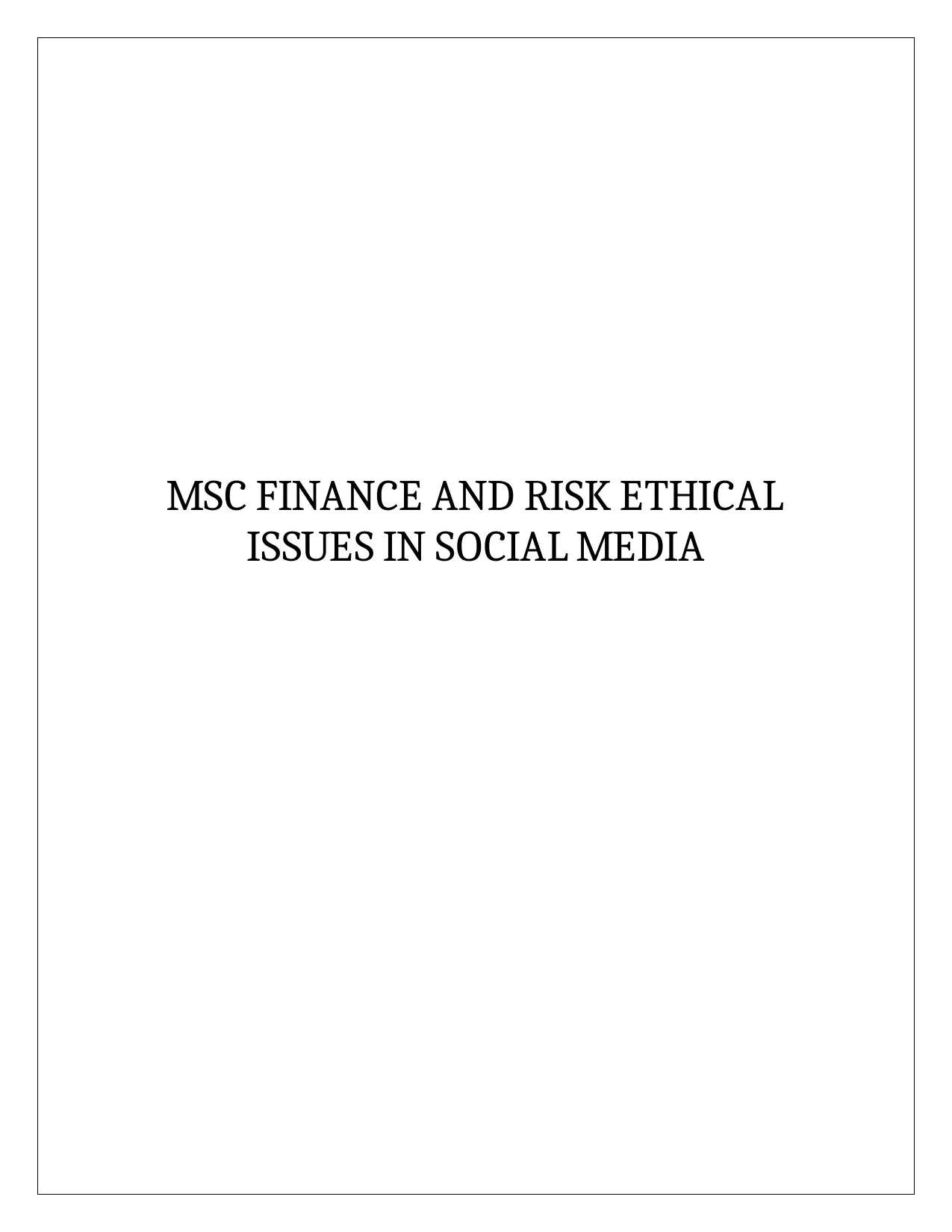
MSC FINANCE AND RISK ETHICAL
ISSUES IN SOCIAL MEDIA
ISSUES IN SOCIAL MEDIA
Paraphrase This Document
Need a fresh take? Get an instant paraphrase of this document with our AI Paraphraser
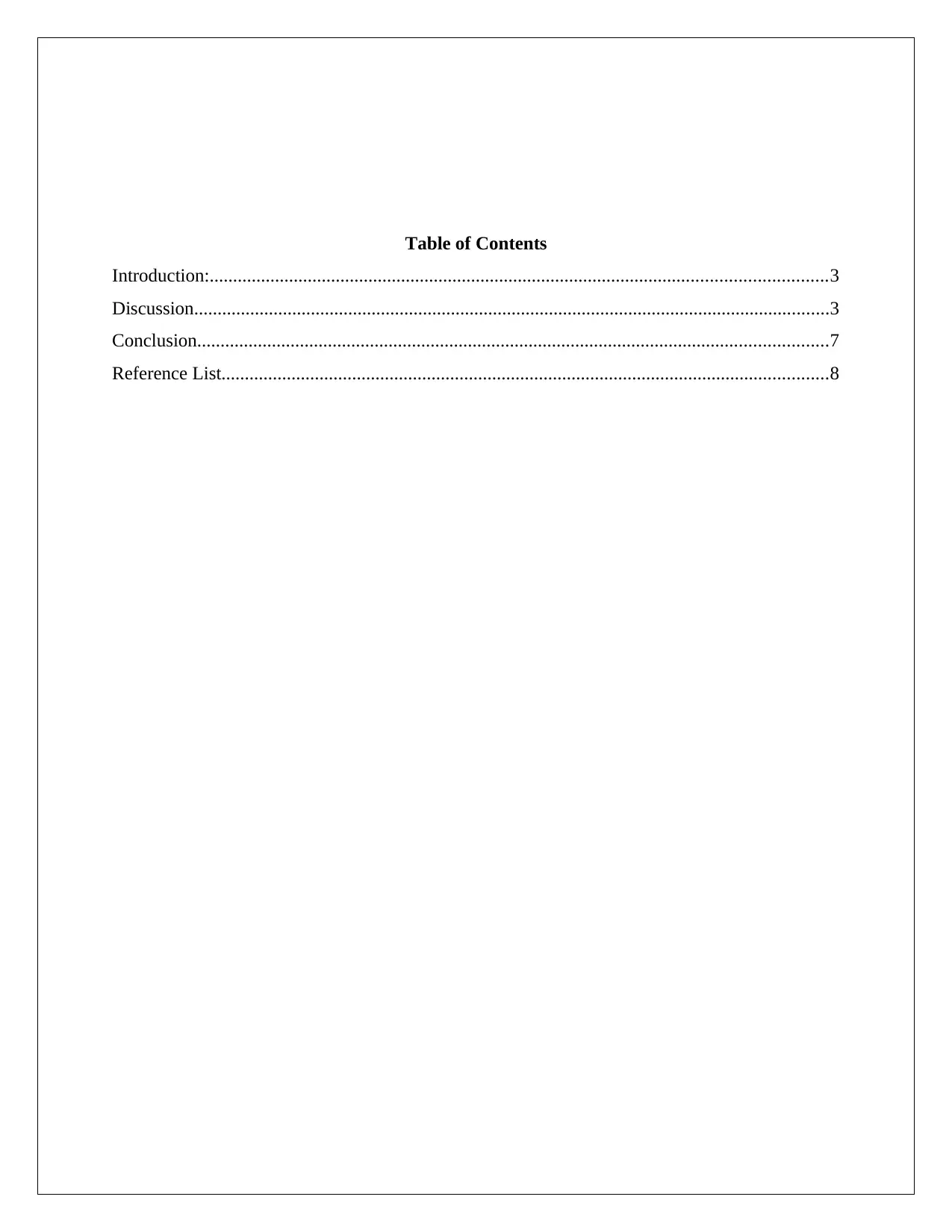
Table of Contents
Introduction:....................................................................................................................................3
Discussion........................................................................................................................................3
Conclusion.......................................................................................................................................7
Reference List..................................................................................................................................8
Introduction:....................................................................................................................................3
Discussion........................................................................................................................................3
Conclusion.......................................................................................................................................7
Reference List..................................................................................................................................8
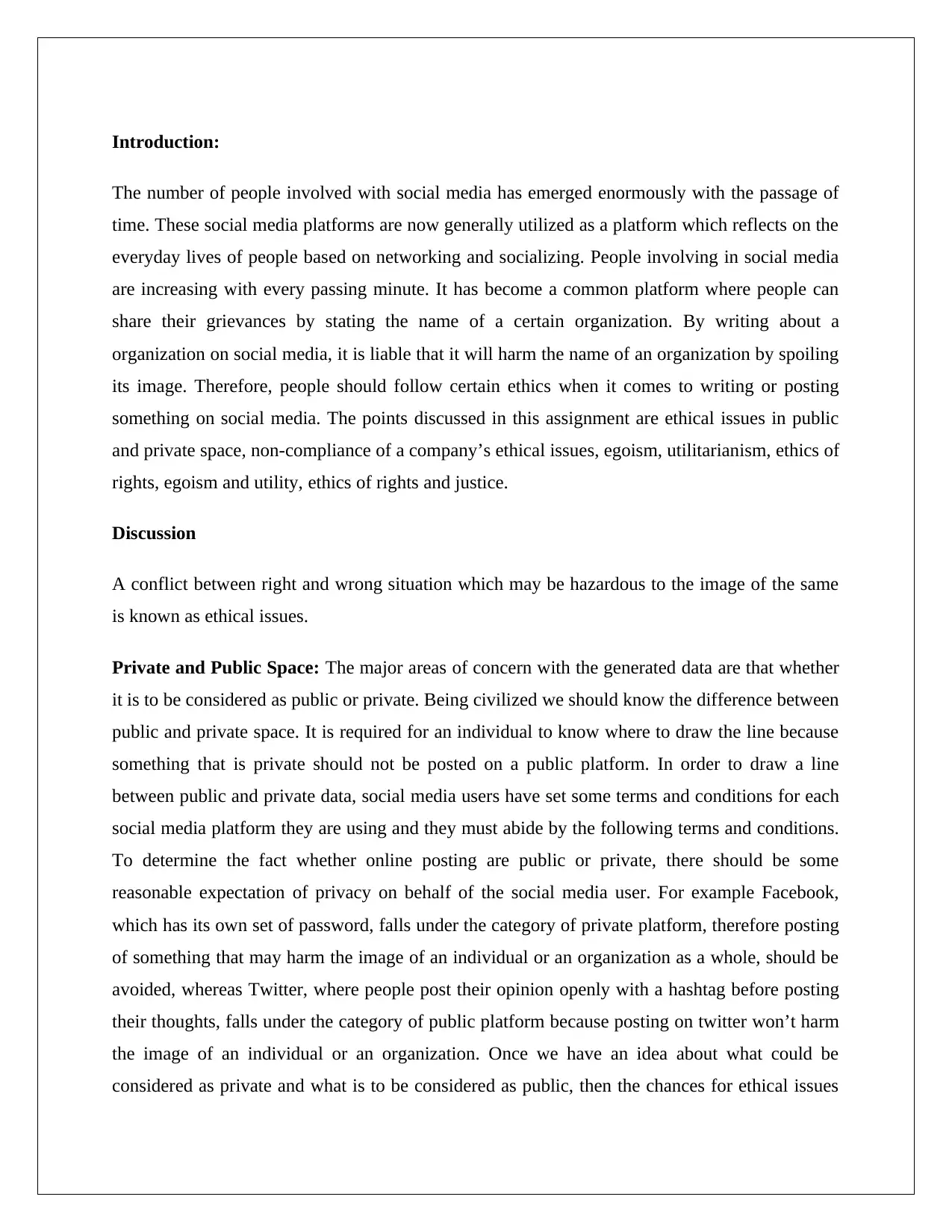
Introduction:
The number of people involved with social media has emerged enormously with the passage of
time. These social media platforms are now generally utilized as a platform which reflects on the
everyday lives of people based on networking and socializing. People involving in social media
are increasing with every passing minute. It has become a common platform where people can
share their grievances by stating the name of a certain organization. By writing about a
organization on social media, it is liable that it will harm the name of an organization by spoiling
its image. Therefore, people should follow certain ethics when it comes to writing or posting
something on social media. The points discussed in this assignment are ethical issues in public
and private space, non-compliance of a company’s ethical issues, egoism, utilitarianism, ethics of
rights, egoism and utility, ethics of rights and justice.
Discussion
A conflict between right and wrong situation which may be hazardous to the image of the same
is known as ethical issues.
Private and Public Space: The major areas of concern with the generated data are that whether
it is to be considered as public or private. Being civilized we should know the difference between
public and private space. It is required for an individual to know where to draw the line because
something that is private should not be posted on a public platform. In order to draw a line
between public and private data, social media users have set some terms and conditions for each
social media platform they are using and they must abide by the following terms and conditions.
To determine the fact whether online posting are public or private, there should be some
reasonable expectation of privacy on behalf of the social media user. For example Facebook,
which has its own set of password, falls under the category of private platform, therefore posting
of something that may harm the image of an individual or an organization as a whole, should be
avoided, whereas Twitter, where people post their opinion openly with a hashtag before posting
their thoughts, falls under the category of public platform because posting on twitter won’t harm
the image of an individual or an organization. Once we have an idea about what could be
considered as private and what is to be considered as public, then the chances for ethical issues
The number of people involved with social media has emerged enormously with the passage of
time. These social media platforms are now generally utilized as a platform which reflects on the
everyday lives of people based on networking and socializing. People involving in social media
are increasing with every passing minute. It has become a common platform where people can
share their grievances by stating the name of a certain organization. By writing about a
organization on social media, it is liable that it will harm the name of an organization by spoiling
its image. Therefore, people should follow certain ethics when it comes to writing or posting
something on social media. The points discussed in this assignment are ethical issues in public
and private space, non-compliance of a company’s ethical issues, egoism, utilitarianism, ethics of
rights, egoism and utility, ethics of rights and justice.
Discussion
A conflict between right and wrong situation which may be hazardous to the image of the same
is known as ethical issues.
Private and Public Space: The major areas of concern with the generated data are that whether
it is to be considered as public or private. Being civilized we should know the difference between
public and private space. It is required for an individual to know where to draw the line because
something that is private should not be posted on a public platform. In order to draw a line
between public and private data, social media users have set some terms and conditions for each
social media platform they are using and they must abide by the following terms and conditions.
To determine the fact whether online posting are public or private, there should be some
reasonable expectation of privacy on behalf of the social media user. For example Facebook,
which has its own set of password, falls under the category of private platform, therefore posting
of something that may harm the image of an individual or an organization as a whole, should be
avoided, whereas Twitter, where people post their opinion openly with a hashtag before posting
their thoughts, falls under the category of public platform because posting on twitter won’t harm
the image of an individual or an organization. Once we have an idea about what could be
considered as private and what is to be considered as public, then the chances for ethical issues
⊘ This is a preview!⊘
Do you want full access?
Subscribe today to unlock all pages.

Trusted by 1+ million students worldwide
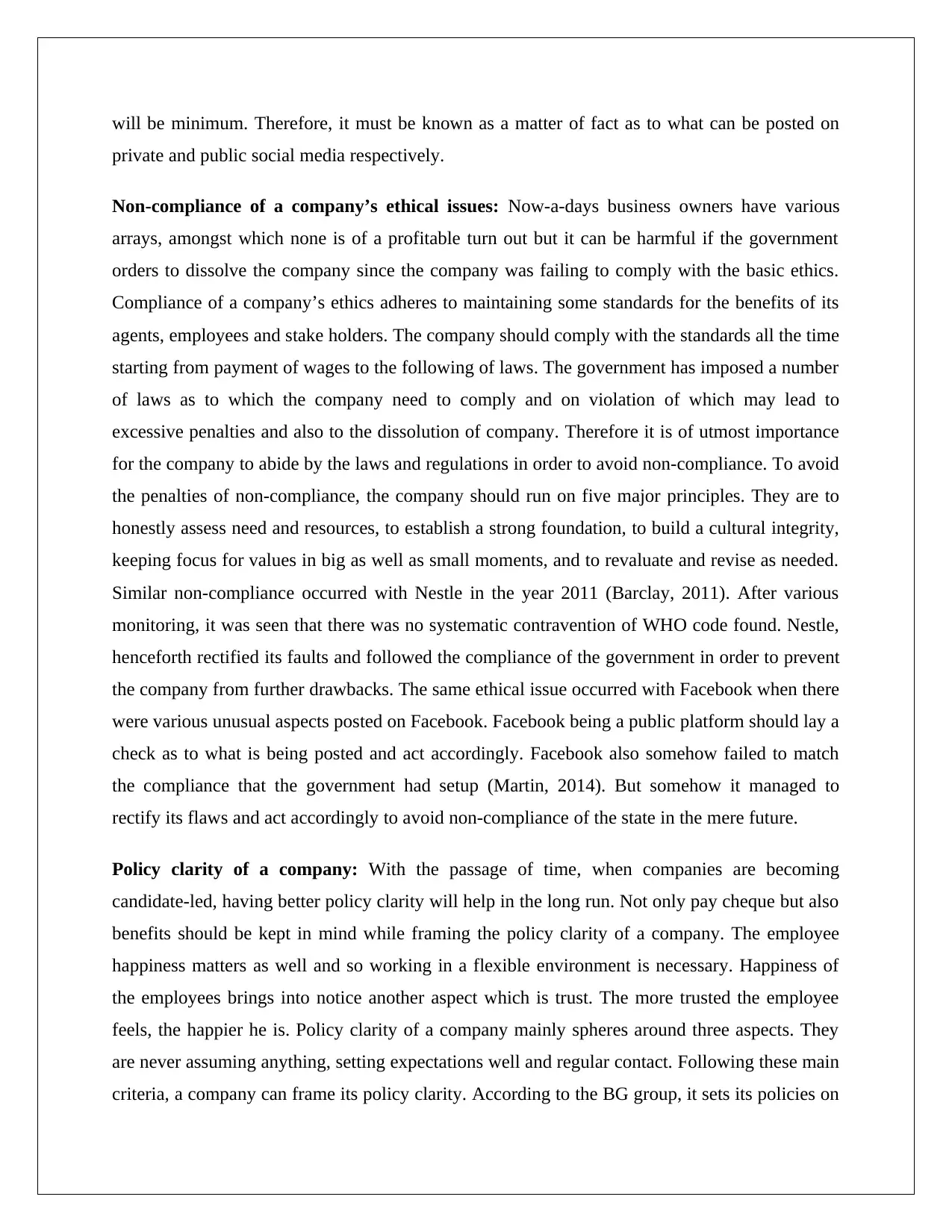
will be minimum. Therefore, it must be known as a matter of fact as to what can be posted on
private and public social media respectively.
Non-compliance of a company’s ethical issues: Now-a-days business owners have various
arrays, amongst which none is of a profitable turn out but it can be harmful if the government
orders to dissolve the company since the company was failing to comply with the basic ethics.
Compliance of a company’s ethics adheres to maintaining some standards for the benefits of its
agents, employees and stake holders. The company should comply with the standards all the time
starting from payment of wages to the following of laws. The government has imposed a number
of laws as to which the company need to comply and on violation of which may lead to
excessive penalties and also to the dissolution of company. Therefore it is of utmost importance
for the company to abide by the laws and regulations in order to avoid non-compliance. To avoid
the penalties of non-compliance, the company should run on five major principles. They are to
honestly assess need and resources, to establish a strong foundation, to build a cultural integrity,
keeping focus for values in big as well as small moments, and to revaluate and revise as needed.
Similar non-compliance occurred with Nestle in the year 2011 (Barclay, 2011). After various
monitoring, it was seen that there was no systematic contravention of WHO code found. Nestle,
henceforth rectified its faults and followed the compliance of the government in order to prevent
the company from further drawbacks. The same ethical issue occurred with Facebook when there
were various unusual aspects posted on Facebook. Facebook being a public platform should lay a
check as to what is being posted and act accordingly. Facebook also somehow failed to match
the compliance that the government had setup (Martin, 2014). But somehow it managed to
rectify its flaws and act accordingly to avoid non-compliance of the state in the mere future.
Policy clarity of a company: With the passage of time, when companies are becoming
candidate-led, having better policy clarity will help in the long run. Not only pay cheque but also
benefits should be kept in mind while framing the policy clarity of a company. The employee
happiness matters as well and so working in a flexible environment is necessary. Happiness of
the employees brings into notice another aspect which is trust. The more trusted the employee
feels, the happier he is. Policy clarity of a company mainly spheres around three aspects. They
are never assuming anything, setting expectations well and regular contact. Following these main
criteria, a company can frame its policy clarity. According to the BG group, it sets its policies on
private and public social media respectively.
Non-compliance of a company’s ethical issues: Now-a-days business owners have various
arrays, amongst which none is of a profitable turn out but it can be harmful if the government
orders to dissolve the company since the company was failing to comply with the basic ethics.
Compliance of a company’s ethics adheres to maintaining some standards for the benefits of its
agents, employees and stake holders. The company should comply with the standards all the time
starting from payment of wages to the following of laws. The government has imposed a number
of laws as to which the company need to comply and on violation of which may lead to
excessive penalties and also to the dissolution of company. Therefore it is of utmost importance
for the company to abide by the laws and regulations in order to avoid non-compliance. To avoid
the penalties of non-compliance, the company should run on five major principles. They are to
honestly assess need and resources, to establish a strong foundation, to build a cultural integrity,
keeping focus for values in big as well as small moments, and to revaluate and revise as needed.
Similar non-compliance occurred with Nestle in the year 2011 (Barclay, 2011). After various
monitoring, it was seen that there was no systematic contravention of WHO code found. Nestle,
henceforth rectified its faults and followed the compliance of the government in order to prevent
the company from further drawbacks. The same ethical issue occurred with Facebook when there
were various unusual aspects posted on Facebook. Facebook being a public platform should lay a
check as to what is being posted and act accordingly. Facebook also somehow failed to match
the compliance that the government had setup (Martin, 2014). But somehow it managed to
rectify its flaws and act accordingly to avoid non-compliance of the state in the mere future.
Policy clarity of a company: With the passage of time, when companies are becoming
candidate-led, having better policy clarity will help in the long run. Not only pay cheque but also
benefits should be kept in mind while framing the policy clarity of a company. The employee
happiness matters as well and so working in a flexible environment is necessary. Happiness of
the employees brings into notice another aspect which is trust. The more trusted the employee
feels, the happier he is. Policy clarity of a company mainly spheres around three aspects. They
are never assuming anything, setting expectations well and regular contact. Following these main
criteria, a company can frame its policy clarity. According to the BG group, it sets its policies on
Paraphrase This Document
Need a fresh take? Get an instant paraphrase of this document with our AI Paraphraser
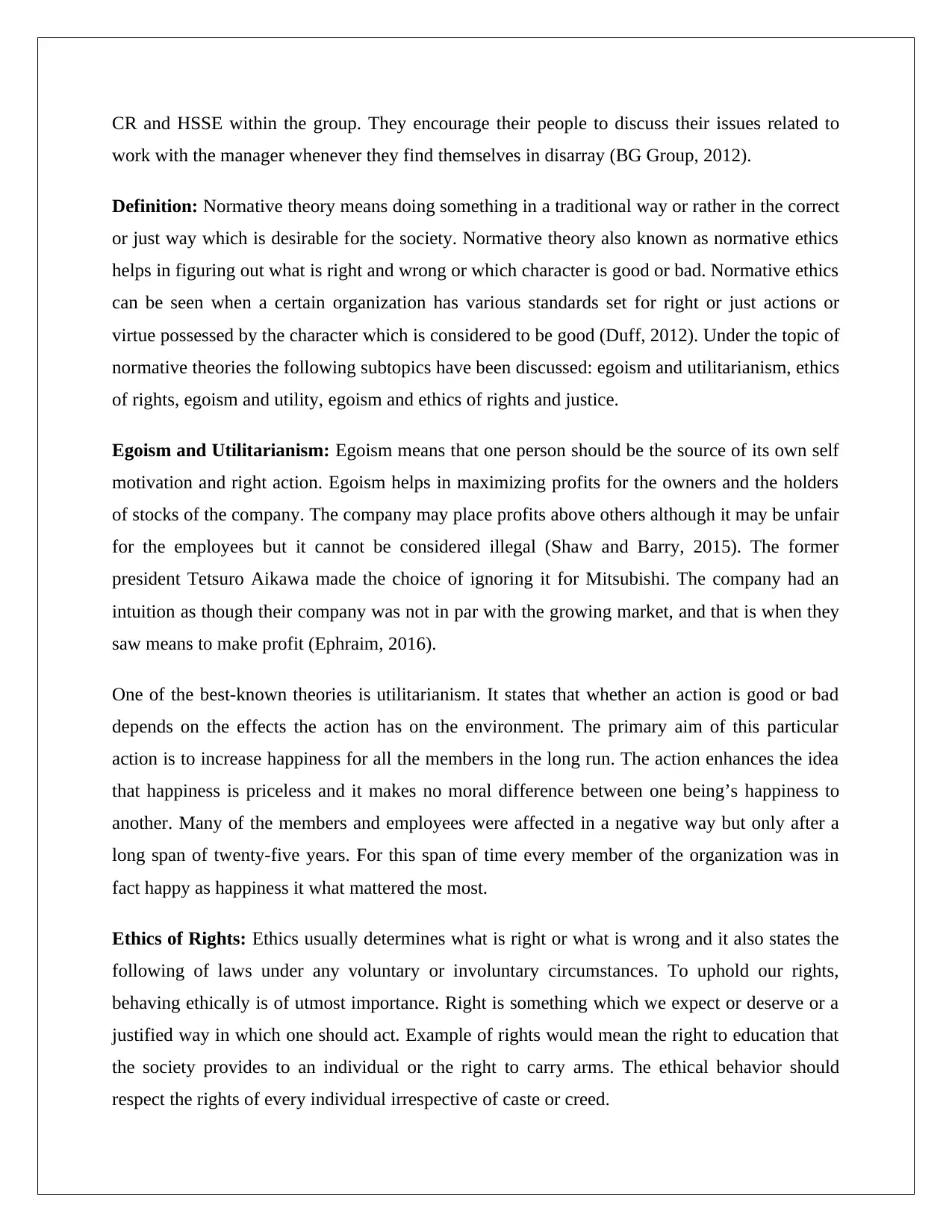
CR and HSSE within the group. They encourage their people to discuss their issues related to
work with the manager whenever they find themselves in disarray (BG Group, 2012).
Definition: Normative theory means doing something in a traditional way or rather in the correct
or just way which is desirable for the society. Normative theory also known as normative ethics
helps in figuring out what is right and wrong or which character is good or bad. Normative ethics
can be seen when a certain organization has various standards set for right or just actions or
virtue possessed by the character which is considered to be good (Duff, 2012). Under the topic of
normative theories the following subtopics have been discussed: egoism and utilitarianism, ethics
of rights, egoism and utility, egoism and ethics of rights and justice.
Egoism and Utilitarianism: Egoism means that one person should be the source of its own self
motivation and right action. Egoism helps in maximizing profits for the owners and the holders
of stocks of the company. The company may place profits above others although it may be unfair
for the employees but it cannot be considered illegal (Shaw and Barry, 2015). The former
president Tetsuro Aikawa made the choice of ignoring it for Mitsubishi. The company had an
intuition as though their company was not in par with the growing market, and that is when they
saw means to make profit (Ephraim, 2016).
One of the best-known theories is utilitarianism. It states that whether an action is good or bad
depends on the effects the action has on the environment. The primary aim of this particular
action is to increase happiness for all the members in the long run. The action enhances the idea
that happiness is priceless and it makes no moral difference between one being’s happiness to
another. Many of the members and employees were affected in a negative way but only after a
long span of twenty-five years. For this span of time every member of the organization was in
fact happy as happiness it what mattered the most.
Ethics of Rights: Ethics usually determines what is right or what is wrong and it also states the
following of laws under any voluntary or involuntary circumstances. To uphold our rights,
behaving ethically is of utmost importance. Right is something which we expect or deserve or a
justified way in which one should act. Example of rights would mean the right to education that
the society provides to an individual or the right to carry arms. The ethical behavior should
respect the rights of every individual irrespective of caste or creed.
work with the manager whenever they find themselves in disarray (BG Group, 2012).
Definition: Normative theory means doing something in a traditional way or rather in the correct
or just way which is desirable for the society. Normative theory also known as normative ethics
helps in figuring out what is right and wrong or which character is good or bad. Normative ethics
can be seen when a certain organization has various standards set for right or just actions or
virtue possessed by the character which is considered to be good (Duff, 2012). Under the topic of
normative theories the following subtopics have been discussed: egoism and utilitarianism, ethics
of rights, egoism and utility, egoism and ethics of rights and justice.
Egoism and Utilitarianism: Egoism means that one person should be the source of its own self
motivation and right action. Egoism helps in maximizing profits for the owners and the holders
of stocks of the company. The company may place profits above others although it may be unfair
for the employees but it cannot be considered illegal (Shaw and Barry, 2015). The former
president Tetsuro Aikawa made the choice of ignoring it for Mitsubishi. The company had an
intuition as though their company was not in par with the growing market, and that is when they
saw means to make profit (Ephraim, 2016).
One of the best-known theories is utilitarianism. It states that whether an action is good or bad
depends on the effects the action has on the environment. The primary aim of this particular
action is to increase happiness for all the members in the long run. The action enhances the idea
that happiness is priceless and it makes no moral difference between one being’s happiness to
another. Many of the members and employees were affected in a negative way but only after a
long span of twenty-five years. For this span of time every member of the organization was in
fact happy as happiness it what mattered the most.
Ethics of Rights: Ethics usually determines what is right or what is wrong and it also states the
following of laws under any voluntary or involuntary circumstances. To uphold our rights,
behaving ethically is of utmost importance. Right is something which we expect or deserve or a
justified way in which one should act. Example of rights would mean the right to education that
the society provides to an individual or the right to carry arms. The ethical behavior should
respect the rights of every individual irrespective of caste or creed.
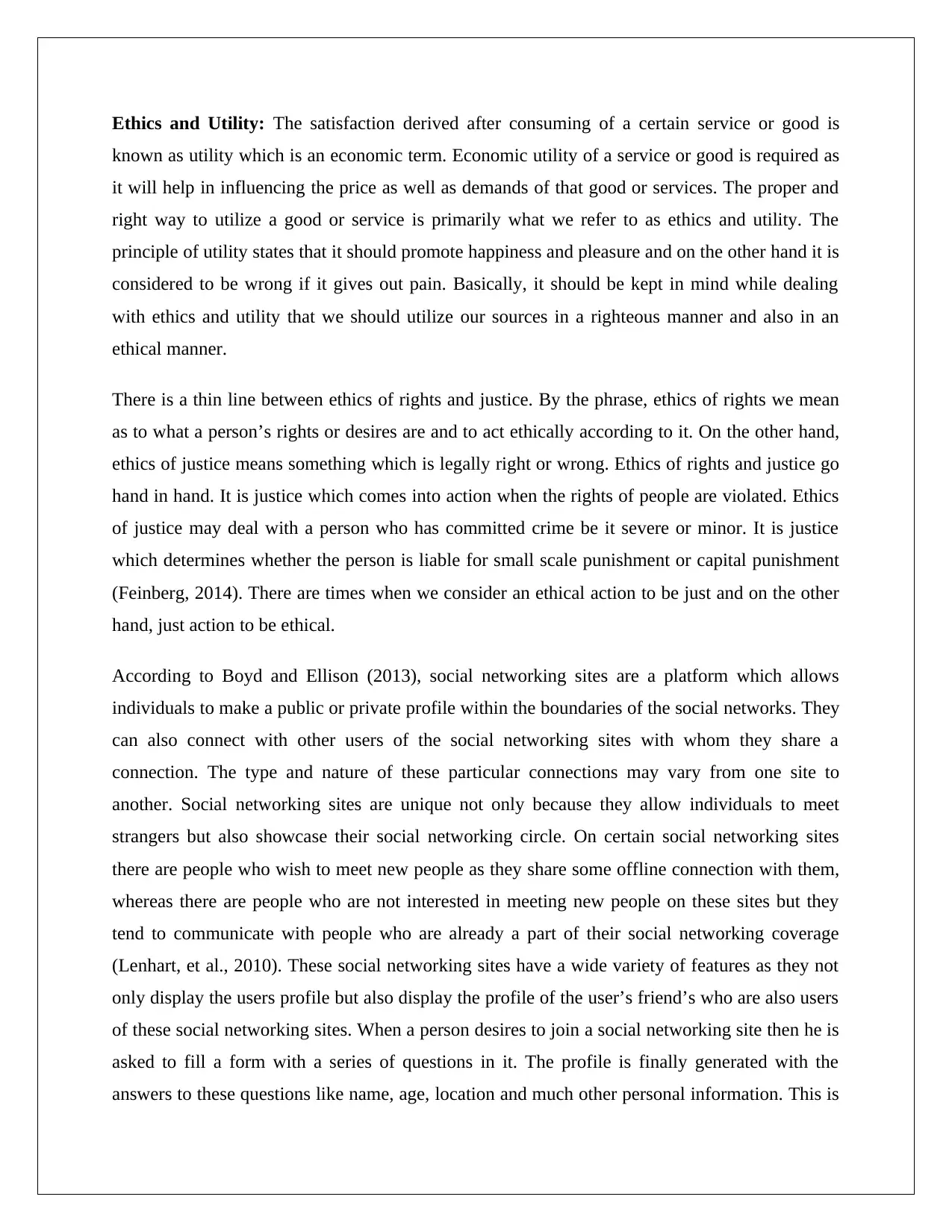
Ethics and Utility: The satisfaction derived after consuming of a certain service or good is
known as utility which is an economic term. Economic utility of a service or good is required as
it will help in influencing the price as well as demands of that good or services. The proper and
right way to utilize a good or service is primarily what we refer to as ethics and utility. The
principle of utility states that it should promote happiness and pleasure and on the other hand it is
considered to be wrong if it gives out pain. Basically, it should be kept in mind while dealing
with ethics and utility that we should utilize our sources in a righteous manner and also in an
ethical manner.
There is a thin line between ethics of rights and justice. By the phrase, ethics of rights we mean
as to what a person’s rights or desires are and to act ethically according to it. On the other hand,
ethics of justice means something which is legally right or wrong. Ethics of rights and justice go
hand in hand. It is justice which comes into action when the rights of people are violated. Ethics
of justice may deal with a person who has committed crime be it severe or minor. It is justice
which determines whether the person is liable for small scale punishment or capital punishment
(Feinberg, 2014). There are times when we consider an ethical action to be just and on the other
hand, just action to be ethical.
According to Boyd and Ellison (2013), social networking sites are a platform which allows
individuals to make a public or private profile within the boundaries of the social networks. They
can also connect with other users of the social networking sites with whom they share a
connection. The type and nature of these particular connections may vary from one site to
another. Social networking sites are unique not only because they allow individuals to meet
strangers but also showcase their social networking circle. On certain social networking sites
there are people who wish to meet new people as they share some offline connection with them,
whereas there are people who are not interested in meeting new people on these sites but they
tend to communicate with people who are already a part of their social networking coverage
(Lenhart, et al., 2010). These social networking sites have a wide variety of features as they not
only display the users profile but also display the profile of the user’s friend’s who are also users
of these social networking sites. When a person desires to join a social networking site then he is
asked to fill a form with a series of questions in it. The profile is finally generated with the
answers to these questions like name, age, location and much other personal information. This is
known as utility which is an economic term. Economic utility of a service or good is required as
it will help in influencing the price as well as demands of that good or services. The proper and
right way to utilize a good or service is primarily what we refer to as ethics and utility. The
principle of utility states that it should promote happiness and pleasure and on the other hand it is
considered to be wrong if it gives out pain. Basically, it should be kept in mind while dealing
with ethics and utility that we should utilize our sources in a righteous manner and also in an
ethical manner.
There is a thin line between ethics of rights and justice. By the phrase, ethics of rights we mean
as to what a person’s rights or desires are and to act ethically according to it. On the other hand,
ethics of justice means something which is legally right or wrong. Ethics of rights and justice go
hand in hand. It is justice which comes into action when the rights of people are violated. Ethics
of justice may deal with a person who has committed crime be it severe or minor. It is justice
which determines whether the person is liable for small scale punishment or capital punishment
(Feinberg, 2014). There are times when we consider an ethical action to be just and on the other
hand, just action to be ethical.
According to Boyd and Ellison (2013), social networking sites are a platform which allows
individuals to make a public or private profile within the boundaries of the social networks. They
can also connect with other users of the social networking sites with whom they share a
connection. The type and nature of these particular connections may vary from one site to
another. Social networking sites are unique not only because they allow individuals to meet
strangers but also showcase their social networking circle. On certain social networking sites
there are people who wish to meet new people as they share some offline connection with them,
whereas there are people who are not interested in meeting new people on these sites but they
tend to communicate with people who are already a part of their social networking coverage
(Lenhart, et al., 2010). These social networking sites have a wide variety of features as they not
only display the users profile but also display the profile of the user’s friend’s who are also users
of these social networking sites. When a person desires to join a social networking site then he is
asked to fill a form with a series of questions in it. The profile is finally generated with the
answers to these questions like name, age, location and much other personal information. This is
⊘ This is a preview!⊘
Do you want full access?
Subscribe today to unlock all pages.

Trusted by 1+ million students worldwide
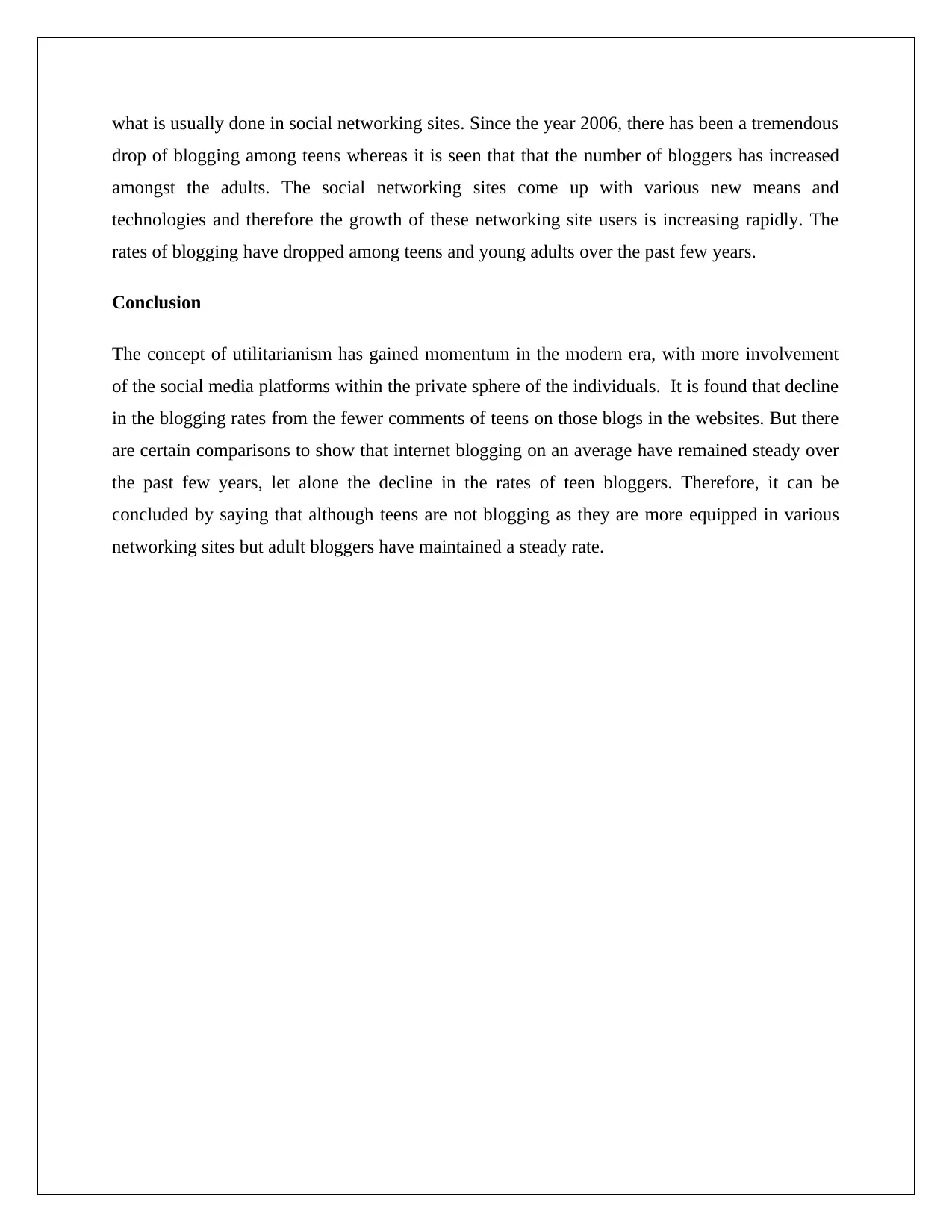
what is usually done in social networking sites. Since the year 2006, there has been a tremendous
drop of blogging among teens whereas it is seen that that the number of bloggers has increased
amongst the adults. The social networking sites come up with various new means and
technologies and therefore the growth of these networking site users is increasing rapidly. The
rates of blogging have dropped among teens and young adults over the past few years.
Conclusion
The concept of utilitarianism has gained momentum in the modern era, with more involvement
of the social media platforms within the private sphere of the individuals. It is found that decline
in the blogging rates from the fewer comments of teens on those blogs in the websites. But there
are certain comparisons to show that internet blogging on an average have remained steady over
the past few years, let alone the decline in the rates of teen bloggers. Therefore, it can be
concluded by saying that although teens are not blogging as they are more equipped in various
networking sites but adult bloggers have maintained a steady rate.
drop of blogging among teens whereas it is seen that that the number of bloggers has increased
amongst the adults. The social networking sites come up with various new means and
technologies and therefore the growth of these networking site users is increasing rapidly. The
rates of blogging have dropped among teens and young adults over the past few years.
Conclusion
The concept of utilitarianism has gained momentum in the modern era, with more involvement
of the social media platforms within the private sphere of the individuals. It is found that decline
in the blogging rates from the fewer comments of teens on those blogs in the websites. But there
are certain comparisons to show that internet blogging on an average have remained steady over
the past few years, let alone the decline in the rates of teen bloggers. Therefore, it can be
concluded by saying that although teens are not blogging as they are more equipped in various
networking sites but adult bloggers have maintained a steady rate.
Paraphrase This Document
Need a fresh take? Get an instant paraphrase of this document with our AI Paraphraser
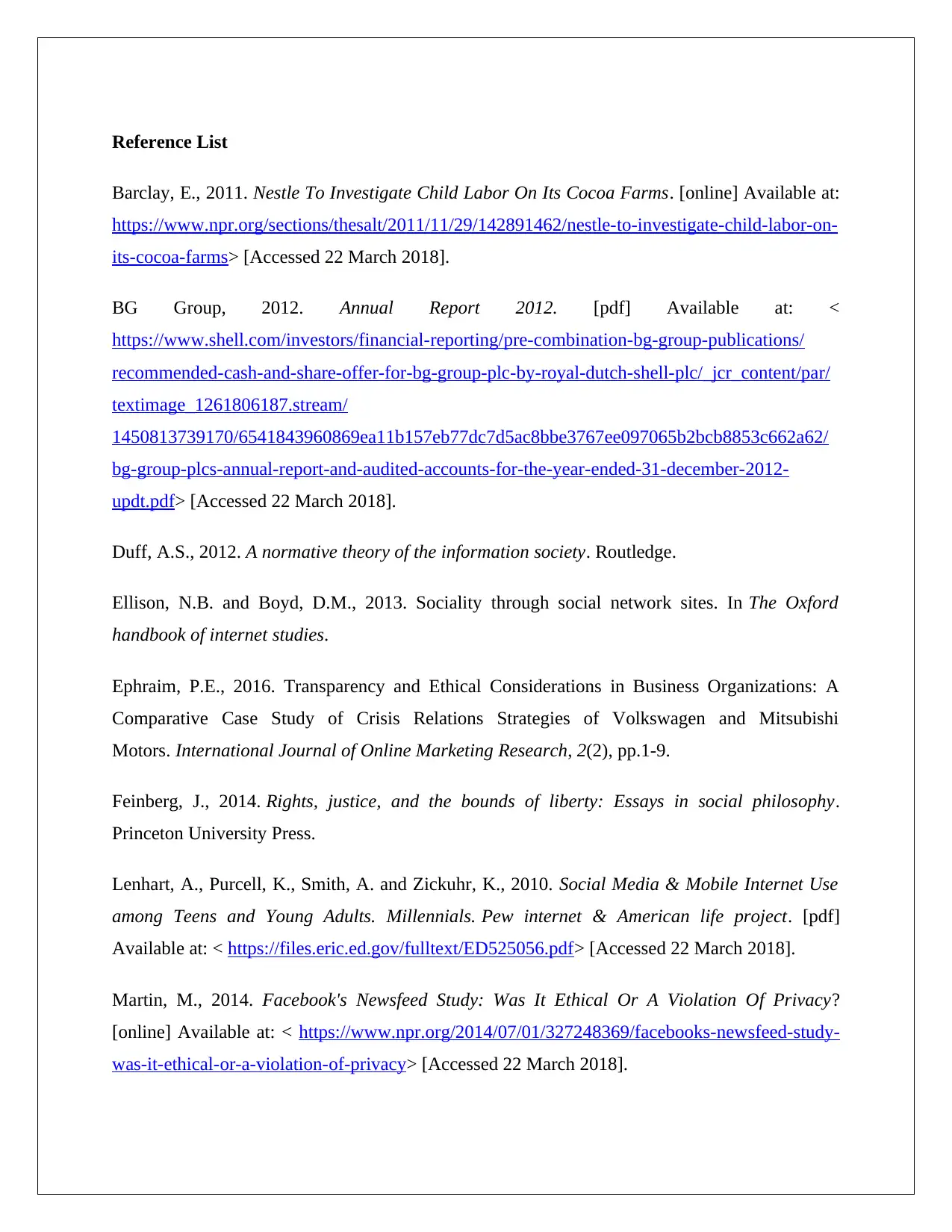
Reference List
Barclay, E., 2011. Nestle To Investigate Child Labor On Its Cocoa Farms. [online] Available at:
https://www.npr.org/sections/thesalt/2011/11/29/142891462/nestle-to-investigate-child-labor-on-
its-cocoa-farms> [Accessed 22 March 2018].
BG Group, 2012. Annual Report 2012. [pdf] Available at: <
https://www.shell.com/investors/financial-reporting/pre-combination-bg-group-publications/
recommended-cash-and-share-offer-for-bg-group-plc-by-royal-dutch-shell-plc/_jcr_content/par/
textimage_1261806187.stream/
1450813739170/6541843960869ea11b157eb77dc7d5ac8bbe3767ee097065b2bcb8853c662a62/
bg-group-plcs-annual-report-and-audited-accounts-for-the-year-ended-31-december-2012-
updt.pdf> [Accessed 22 March 2018].
Duff, A.S., 2012. A normative theory of the information society. Routledge.
Ellison, N.B. and Boyd, D.M., 2013. Sociality through social network sites. In The Oxford
handbook of internet studies.
Ephraim, P.E., 2016. Transparency and Ethical Considerations in Business Organizations: A
Comparative Case Study of Crisis Relations Strategies of Volkswagen and Mitsubishi
Motors. International Journal of Online Marketing Research, 2(2), pp.1-9.
Feinberg, J., 2014. Rights, justice, and the bounds of liberty: Essays in social philosophy.
Princeton University Press.
Lenhart, A., Purcell, K., Smith, A. and Zickuhr, K., 2010. Social Media & Mobile Internet Use
among Teens and Young Adults. Millennials. Pew internet & American life project. [pdf]
Available at: < https://files.eric.ed.gov/fulltext/ED525056.pdf> [Accessed 22 March 2018].
Martin, M., 2014. Facebook's Newsfeed Study: Was It Ethical Or A Violation Of Privacy?
[online] Available at: < https://www.npr.org/2014/07/01/327248369/facebooks-newsfeed-study-
was-it-ethical-or-a-violation-of-privacy> [Accessed 22 March 2018].
Barclay, E., 2011. Nestle To Investigate Child Labor On Its Cocoa Farms. [online] Available at:
https://www.npr.org/sections/thesalt/2011/11/29/142891462/nestle-to-investigate-child-labor-on-
its-cocoa-farms> [Accessed 22 March 2018].
BG Group, 2012. Annual Report 2012. [pdf] Available at: <
https://www.shell.com/investors/financial-reporting/pre-combination-bg-group-publications/
recommended-cash-and-share-offer-for-bg-group-plc-by-royal-dutch-shell-plc/_jcr_content/par/
textimage_1261806187.stream/
1450813739170/6541843960869ea11b157eb77dc7d5ac8bbe3767ee097065b2bcb8853c662a62/
bg-group-plcs-annual-report-and-audited-accounts-for-the-year-ended-31-december-2012-
updt.pdf> [Accessed 22 March 2018].
Duff, A.S., 2012. A normative theory of the information society. Routledge.
Ellison, N.B. and Boyd, D.M., 2013. Sociality through social network sites. In The Oxford
handbook of internet studies.
Ephraim, P.E., 2016. Transparency and Ethical Considerations in Business Organizations: A
Comparative Case Study of Crisis Relations Strategies of Volkswagen and Mitsubishi
Motors. International Journal of Online Marketing Research, 2(2), pp.1-9.
Feinberg, J., 2014. Rights, justice, and the bounds of liberty: Essays in social philosophy.
Princeton University Press.
Lenhart, A., Purcell, K., Smith, A. and Zickuhr, K., 2010. Social Media & Mobile Internet Use
among Teens and Young Adults. Millennials. Pew internet & American life project. [pdf]
Available at: < https://files.eric.ed.gov/fulltext/ED525056.pdf> [Accessed 22 March 2018].
Martin, M., 2014. Facebook's Newsfeed Study: Was It Ethical Or A Violation Of Privacy?
[online] Available at: < https://www.npr.org/2014/07/01/327248369/facebooks-newsfeed-study-
was-it-ethical-or-a-violation-of-privacy> [Accessed 22 March 2018].
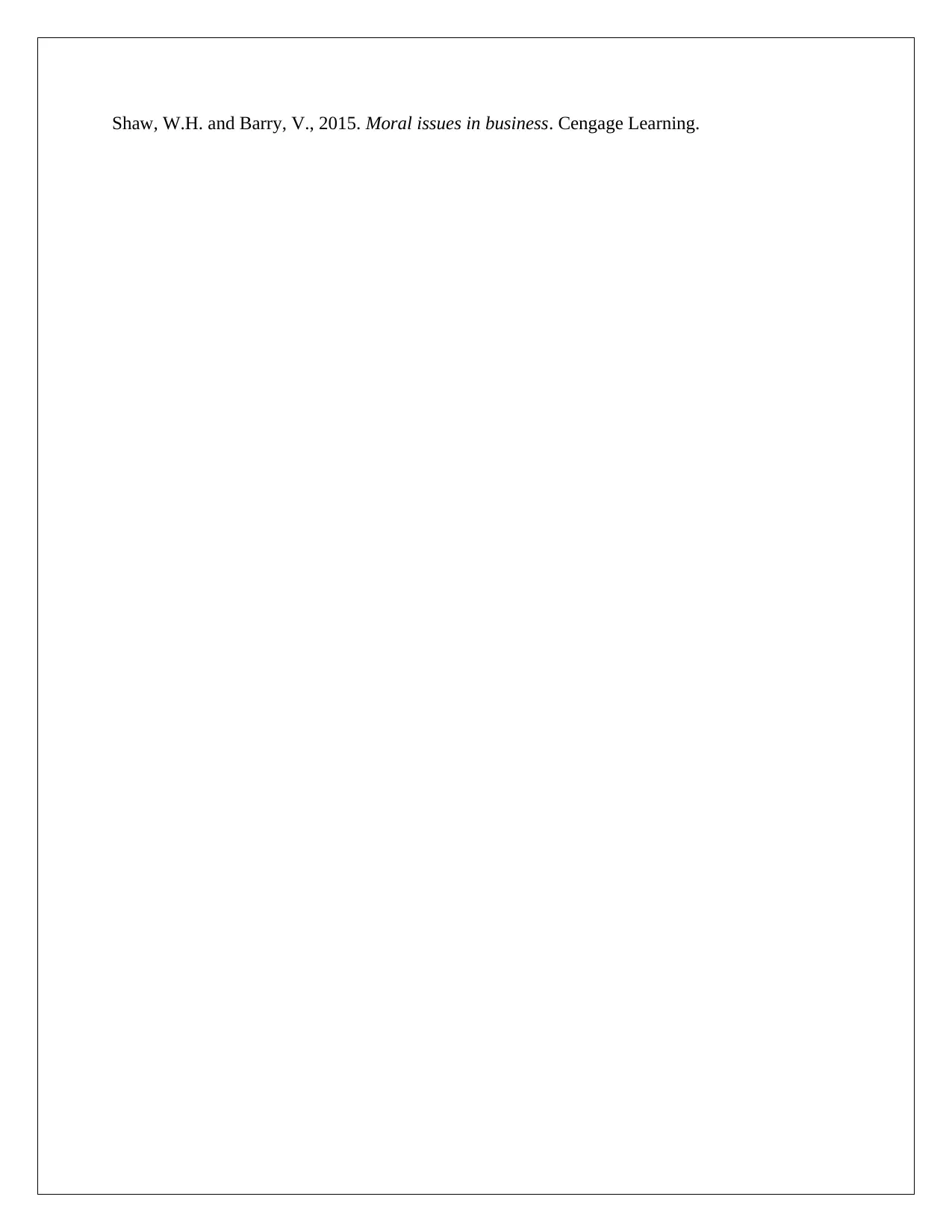
Shaw, W.H. and Barry, V., 2015. Moral issues in business. Cengage Learning.
⊘ This is a preview!⊘
Do you want full access?
Subscribe today to unlock all pages.

Trusted by 1+ million students worldwide
1 out of 9
Related Documents
Your All-in-One AI-Powered Toolkit for Academic Success.
+13062052269
info@desklib.com
Available 24*7 on WhatsApp / Email
![[object Object]](/_next/static/media/star-bottom.7253800d.svg)
Unlock your academic potential
Copyright © 2020–2026 A2Z Services. All Rights Reserved. Developed and managed by ZUCOL.





